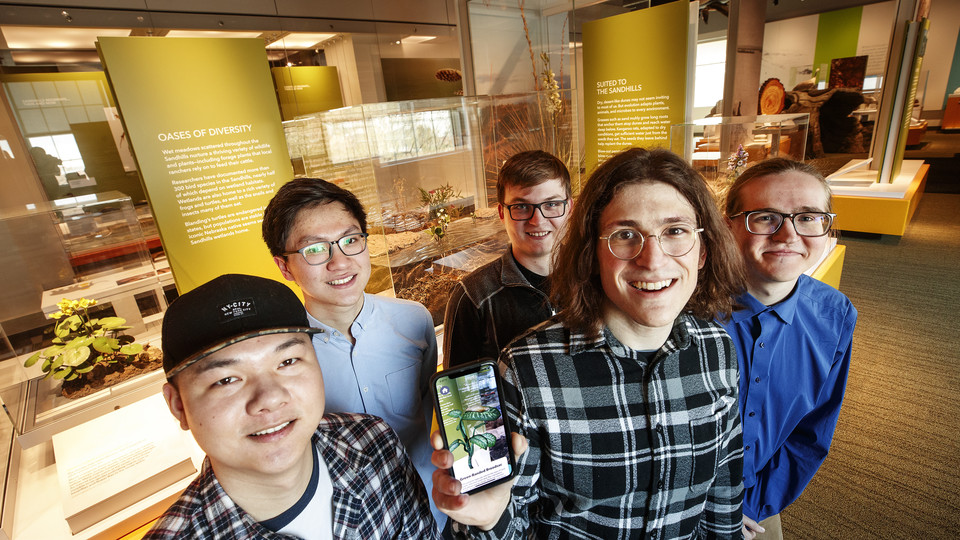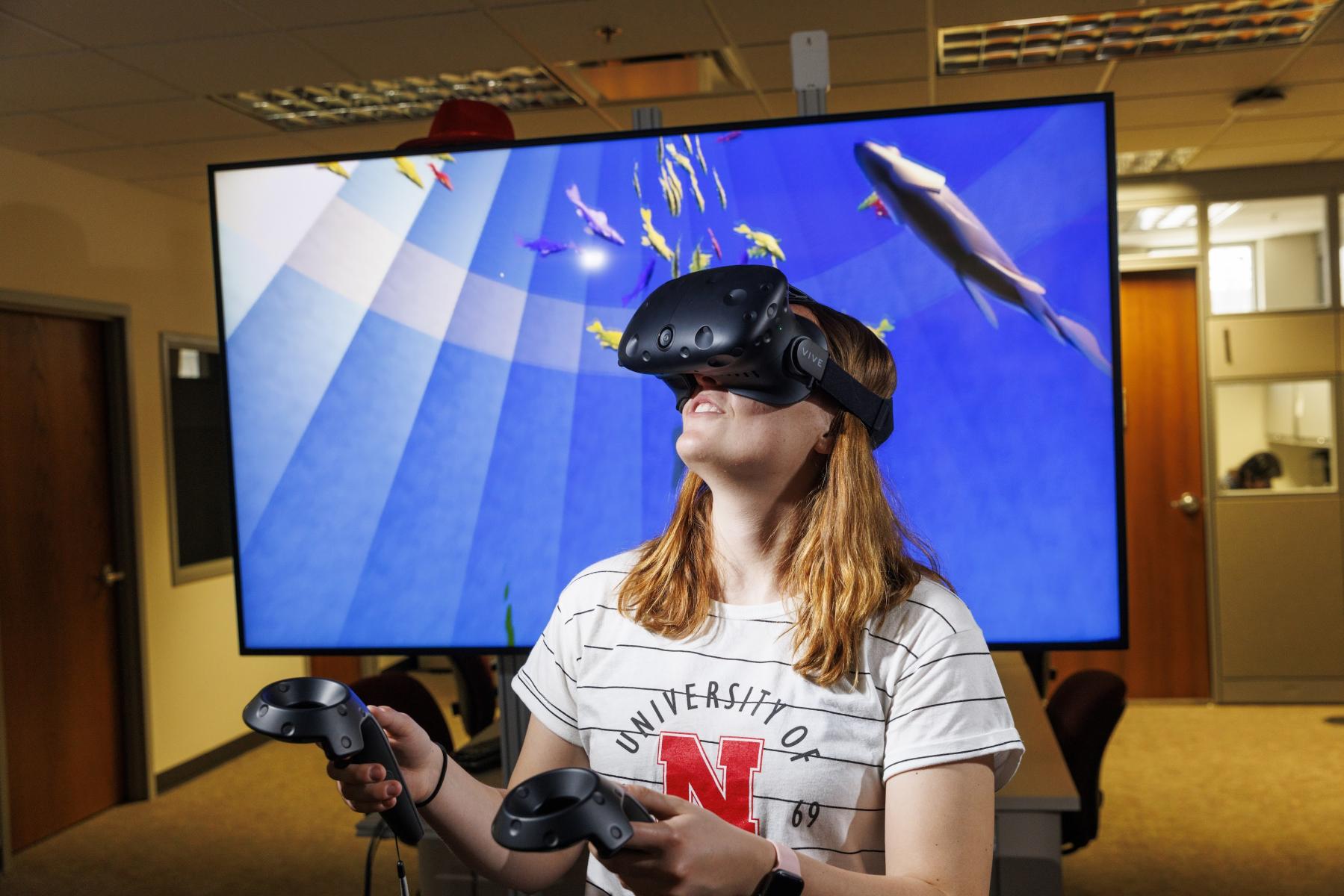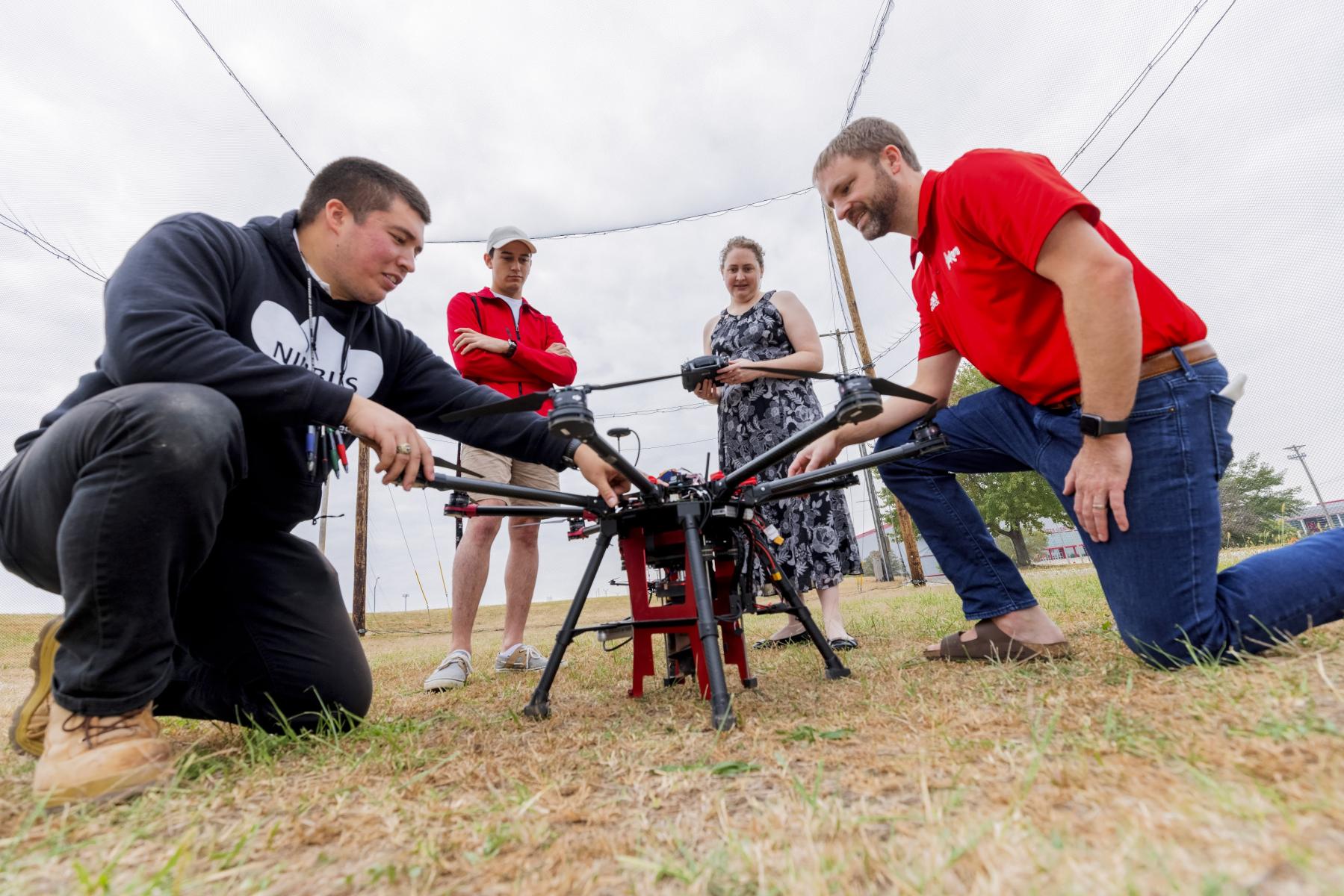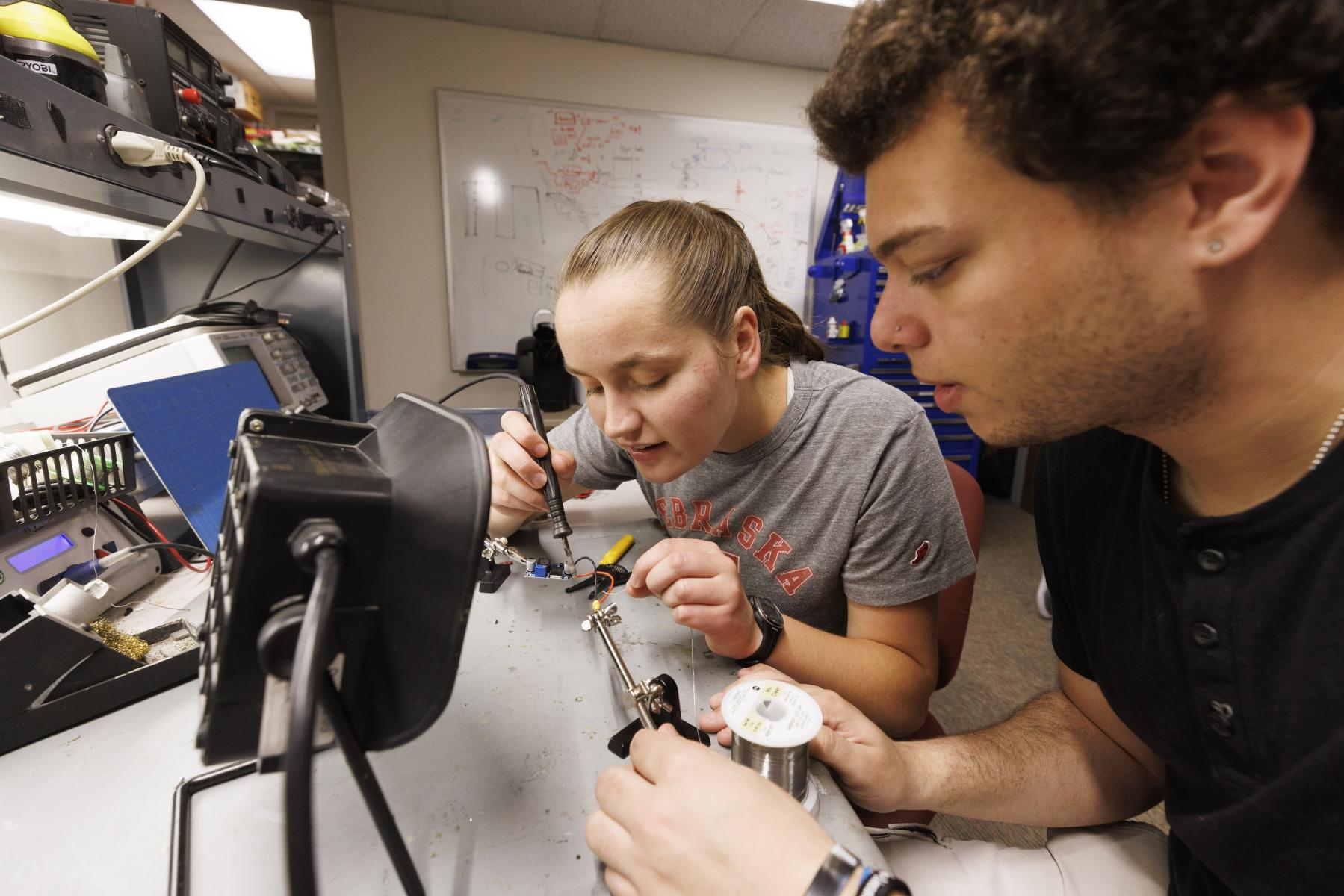Why Computer Engineering?
The computer engineering major focuses on the integration of hardware and software system design, and students will learn to combine computing concepts with technical hardware skills. This major prepares students with the range of expertise required to develop a holistic view of computer-based systems and to make global design decisions.
- Embedded Systems and Robotics
- VLSI Design
- Signal Processing and Communications
- High-Performance Computing
What You'll Learn
- Computer engineering majors study electronics, circuits, and advanced topics such as robotics, embedded and cyber-physical systems, architecture, and high-performance computing. Computer engineering students learn how to combine computing concepts with technical hardware skills and electrical engineering principles to build and operate physical computing systems.
Learning Outcomes
- An ability to identify, formulate, and solve complex engineering problems by applying principles of engineering, science, and mathematics.
- An ability to apply engineering design to produce solutions that meet specified needs with consideration of public health, safety, and welfare, as well as global, cultural, social, environmental, and economic factors.
- An ability to develop and conduct appropriate experimentation, analyze and interpret data, and use engineering judgment to draw conclusions.
Career Connections
- Connect with industry professionals through frequent career events.
- Gain insight into the world of practicing professionals for collaborations, mutual support, and representing the profession to government and society.
- Learn to work with professionals in related fields over the spectrum of system design.
Study and combine computer science with engineering principles
100% placement rate for new graduates seeking work
80% of graduates get first job offers before diplomas
How You’ll Learn
Hands-On Learning Experiences
- Participate in our annual student-led CornHacks hackathon.
- Assist distinguished faculty in groundbreaking research.
- Complete our Senior Design capstone course, in which you’ll spend a full academic year developing a new product with a faculty or industry sponsor.
Transferable Career Skills
- Implement appropriate technological interventions to help solve problems.
- Make decisions carefully, using appropriate theoretical frameworks.
- Simplify complex information and present it to others.
Social Connections
- Study and socialize with fellow majors in our Student Resource Center community hub.
- Join computing-focused student organizations to learn new skills and connect with students who share your interests.
- Live, study, and explore opportunities with other computing students by joining a Learning Community.
Making a Difference
- Volunteer to mentor younger computing students through robotics clubs, coding camps, or local STEM organizations.
- Join our student organization Initialize, a club dedicated to giving back to the community through computing.
- Promote diversity in technology through campus events and local initiatives.
Core Academics
- Understand computer systems as an integrated continuum of technologies and to engage in integrated system-level design.
- Learn to work in conformance with societal needs and expectations.
- Develop the skills to quickly adapt to new work environments, assimilate new information, and solve new problems.
Research and Grad School Prep
- Become an undergraduate research assistant and conduct research alongside graduate students and faculty through our programs and labs.
- Connect with course instructors and receive guidance in exploring your research and career options.
- Attend our annual Grad Info Day event to explore our graduate programs and opportunities.
Program Features
- Undergraduate Research. Our students are invited and encouraged to participate in faculty-supervised research supported by grants and the university’s UCARE program.
- Prime Silicon Prairie Location. The university is within walking distance from dozens of local tech startups and thriving companies. Students don’t have to look far to land a great internship or a first job.
- Real-World Experience. Our program prepares students for their professional futures by modeling course curriculum after industry work, allowing them to seamlessly transition from classroom to career after graduation.
- Career Connections. We host a variety of career events throughout the school year designed to help students explore career opportunities, connect with hiring companies, and introduce themselves to potential employers.

Research and Academic Opportunities
Innovate in Senior Design

In our Senior Design course, students spend a full academic year working on a team to complete a real-world project for an industry or faculty sponsor.
Engage in Cutting-Edge Research

Many of our students join faculty in their research labs to gain research experience in a specific area of computing. Our NIMBUS Lab allows students to study and participate in drone development.
Learn by Connecting

Our Learning Assistant Program is dedicated to helping first-year computing majors succeed through partnerships with upper-level students, academic support, and improved learning experiences.
Student Organizations
The School of Computing is home to several highly engaged student organizations. These clubs provide a great opportunity to grow as a leader, gain experience, make meaningful connections, and have fun.
The School of Computing Advisory Board (cSAB)
This group is committed to helping the school improve by making student voices heard by faculty, staff, and leadership. This group organizes regular student events, such as the annual Involvement Fair and Student Advisory Panel, and leads initiatives to enhance student experiences.
Initialize is a group dedicated to using computing skills to give back to the local community. This club’s activities include teaching robotics concepts to Lincoln middle schoolers, mentoring Girl Scouts at coding camps, and building new software for local nonprofits.
The Operating Systems and Open-Source Group (OS2G) is a club for users of Linux and other free and open-source software (FOSS) to meet, socialize, and learn from one another.
The university's only club focused on learning to develop video games. This group aims to guide students in learning effective professional game development techniques.
Recent Student Placements
Internships
- Aviation Software Engineer, Garmin - Olathe, KS
- Software Engineer Intern, Microsoft - Redmond, WA
- Simulation Lab Intern, University of Nebraska Medical Center - Omaha, NE
- Hardware Engineer, Springbok Inc. - Omaha, NE
- Quality Engineer Intern, Bosch Security Systems - Lincoln, NE
Careers
- Product Manager, Hudl - Lincoln, NE
- Embedded Systems Engineer, Lockheed Martin - Denver, CO
- Computer Engineer, United States Department of Defense - San Antonio, TX
- Frontend Engineer, Hayneedle, Inc. - Omaha, NE
- Software Developer, Epic Systems - Verona, WI
Graduate Schools
- Electrical Engineering, M.S., University of Nebraska–Lincoln - Lincoln, NE
- Robotics Engineering, Northwestern University - Evanston, IL
- Visualization, M.S., Texas A&M University - College Station, TX
- Medical Sciences Interdepartmental Areas, University of Nebraska Medical Center - Omaha, NE
- Software Engineering, M.Sc., University of Sheffield - Sheffield, Great Britain
4-Year Plan and Notable Courses
Explore major requirements and the courses you'll be taking through the 4-year plan.
CSCE 155E: Computer Science I: Systems Engineering Focus
Introduction to problem solving with computers. Topics include problem solving methods, software development principles, computer programming, and computing in society.
CSCE 156: Computer Science II
Data structures, including linked lists, stacks, queues, and trees; algorithms, including searching, sorting, and recursion; programming language topics, including object-oriented programming; pointers, references, and memory management; design and implementation of a multilayer application with SQL database.
CSCE 235: Introduction to Discrete Structures
Survey of elementary discrete mathematics. Elementary graph and tree theories, set theory, relations and functions, propositional and predicate logic, methods of proof, induction, recurrence relations, principles of counting, elementary combinatorics, and asymptotic notations.
CSCE 251: Unix Programming Environment
Introduction to the Unix operating system. Unix file system. Unix tools and utilities. Shell programming.
CSCE 335: Digital Logic Design
Combinational and sequential logic circuits. MSI chips, programmable logic devices (PAL, ROM, PLA) used to design combinational and sequential circuits. Hardware design experience.
CSCE 336: Embedded Systems
Introduction to designing, interfacing, configuring, and programming embedded systems. Configure simple embedded microprocessor systems, control peripherals, write device drivers in a high-level language, set up embedded and real-time operating systems, and develop applications for embedded systems.
Contact Us

Olivia Ingle
Recruitment Coordinator
(402) 472-5027
olivia.ingle@unl.edu

